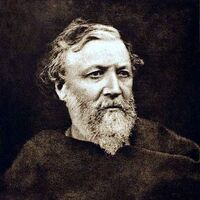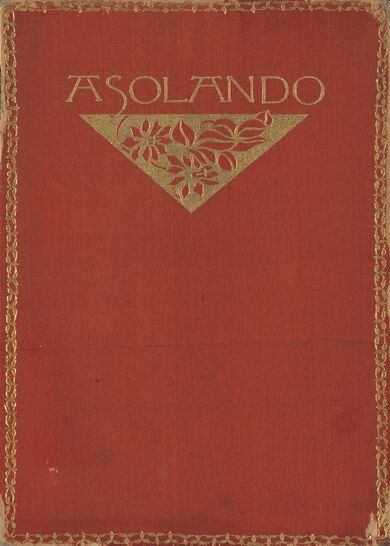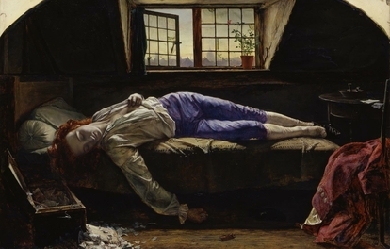Glove, The
(PETER RONSARD _loquitur_.)
‘Heigho!’ yawned one day King Francis,
‘Distance all value enhances!
’When a man’s busy, why, leisure
‘Strikes him as wonderful pleasure:
’ ‘Faith, and at leisure once is he?
’Straightway he wants to be busy.
'Here we’ve got peace; and aghast I’m
‘Caught thinking war the true pastime.
’Is there a reason in metre?
‘Give us your speech, master Peter!’
I who, if mortal dare say so,
Ne’er am at loss with my Naso,
‘Sire,’ I replied, ‘joys prove cloudlets:
’Men are the merest Ixions’—-
Here the King whistled aloud, 'Let’s
‘—-Heigho—-go look at our lions!’
Such are the sorrowful chances
If you talk fine to King Francis.
And so, to the courtyard proceeding,
Our company, Francis was leading,
Increased by new followers tenfold
Before be arrived at the penfold;
Lords, ladies, like clouds which bedizen
At sunset the western horizon.
And Sir De Lorge pressed 'mid the foremost
With the dame he professed to adore most.
Oh, what a face! One by fits eyed
Her, and the horrible pitside;
For the penfold surrounded a hollow
Which led where the eye scarce dared follow,
And shelved to the chamber secluded
Where Bluebeard, the great lion, brooded.
The King bailed his keeper, an Arab
As glossy and black as a scarab,*1
And bade him make sport and at once stir
Up and out of his den the old monster.
They opened a hole in the wire-work
Across it, and dropped there a firework,
And fled: one’s heart’s beating redoubled;
A pause, while the pit’s mouth was troubled,
The blackness and silence so utter,
By the firework’s slow sparkling and sputter;
Then earth in a sudden contortion
Gave out to our gaze her abortion.
Such a brute! Were I friend Clement Marot
(Whose experience of nature’s but narrow,
And whose faculties move in no small mist
When he versifies David the Psalmist)
I should study that brute to describe you
_Illim Juda Leonem de Tribu_.
One’s whole blood grew curdling and creepy
To see the black mane, vast and heapy,
The tail in the air stiff and straining,
The wide eyes, nor waxing nor waning,
As over the barrier which bounded
His platform, and us who surrounded
The barrier, they reached and they rested
On space that might stand him in best stead:
For who knew, he thought, what the amazement,
The eruption of clatter and blaze meant,
And if, in this minute of wonder,
No outlet, 'mid lightning and thunder,
Lay broad, and, his shackles all shivered,
The lion at last was delivered?
Ay, that was the open sky o’erhead!
And you saw by the flash on his forehead,
By the hope in those eyes wide and steady,
He was leagues in the desert already,
Driving the flocks up the mountain,
Or catlike couched hard by the fountain
To waylay the date-gathering negress:
So guarded he entrance or egress.
‘How he stands!’ quoth the King: 'we may well swear,
('No novice, we’ve won our spurs elsewhere
'And so can afford the confession,)
‘We exercise wholesome discretion
’In keeping aloof from his threshold;
‘Once hold you, those jaws want no fresh hold,
’Their first would too pleasantly purloin
'The visitor’s brisket or surloin:
'But who’s he would prove so fool-hardy?
‘Not the best man of Marignan, pardie!’
The sentence no sooner was uttered,
Than over the rails a glove flattered,
Fell close to the lion, and rested:
The dame 'twas, who flung it and jested
With life so, De Lorge had been wooing
For months past; he sat there pursuing
His suit, weighing out with nonchalance
Fine speeches like gold from a balance.
Sound the trumpet, no true knight’s a tarrier!
De Lorge made one leap at the barrier,
Walked straight to the glove,—-while the lion
Neer moved, kept his far-reaching eye on
The palm-tree-edged desert-spring’s sapphire,
And the musky oiled skin of the Kaffir,—-
Picked it up, and as calmly retreated,
Leaped back where the lady was seated,
And full in the face of its owner
Flung the glove.
'Your heart’s queen, you dethrone her?
‘So should I!’—-cried the King—-''twas mere vanity,
‘Not love, set that task to humanity!’
Lords and ladies alike turned with loathing
From such a proved wolf in sheep’s clothing.
Not so, I; for I caught an expression
In her brow’s undisturbed self-possession
Amid the Court’s scoffing and merriment,—-
As if from no pleasing experiment
She rose, yet of pain not much heedful
So long as the process was needful,—-
As if she had tried in a crucible,
To what 'speeches like gold’ were reducible,
And, finding the finest prove copper,
Felt the smoke in her face was but proper;
To know what she had _not_ to trust to,
Was worth all the ashes and dust too.
She went out 'mid hooting and laughter;
Clement Marot stayed; I followed after,
And asked, as a grace, what it all meant?
If she wished not the rash deed’s recalment?
'For I’—-so I spoke—-'am a poet:
‘Human nature,—-behoves that I know it!’
She told me, ‘Too long had I heard
’Of the deed proved alone by the word:
‘For my love—-what De Lorge would not dare!
’With my scorn—-what De Lorge could compare!
‘And the endless descriptions of death
’He would brave when my lip formed a breath,
‘I must reckon as braved, or, of course,
’Doubt his word—-and moreover, perforce,
‘For such gifts as no lady could spurn,
’Must offer my love in return.
‘When I looked on your lion, it brought
’All the dangers at once to my thought,
‘Encountered by all sorts of men,
’Before he was lodged in his den,—-
‘From the poor slave whose club or bare hands
’Dug the trap, set the snare on the sands,
‘With no King and no Court to applaud,
’By no shame, should he shrink, overawed,
‘Yet to capture the creature made shift,
’That his rude boys might laugh at the gift,
'—-To the page who last leaped o’er the fence
‘Of the pit, on no greater pretence
’Than to get back the bonnet he dropped,
‘Lest his pay for a week should be stopped.
’So, wiser I judged it to make
‘One trial what ’death for my sake’
‘Really meant, while the power was yet mine,
’Than to wait until time should define
‘Such a phrase not so simply as I,
’Who took it to mean just ‘to die.’
‘The blow a glove gives is but weak:
’Does the mark yet discolour my cheek?
‘But when the heart suffers a blow,
’Will the pain pass so soon, do you know?'
I looked, as away she was sweeping,
And saw a youth eagerly keeping
As close as he dared to the doorway.
No doubt that a noble should more weigh
His life than befits a plebeian;
And yet, had our brute been Nemean—-
(I judge by a certain calm fervour
The youth stepped with, forward to serve her)
—-He’d have scarce thought you did him the worst turn
If you whispered 'Friend, what you’d get, first earn!'
And when, shortly after, she carried
Her shame from the Court, and they married,
To that marriage some happiness, maugre
The voice of the Court, I dared augur.
For De Lorge, he made women with men vie,
Those in wonder and praise, these in envy;
And in short stood so plain a head taller
That he wooed and won... how do you call her?
The beauty, that rose in the sequel
To the King’s love, who loved her a week well.
And 'twas noticed he never would honour
De Lorge (who looked daggers upon her)
With the easy commission of stretching
His legs in the service, and fetching
His wife, from her chamber, those straying
Sad gloves she was always mislaying,
While the King took the closet to chat in,—-
But of course this adventure came pat in.
And never the King told the story,
How bringing a glove brought such glory,
But the wife smiled—-'His nerves are grown firmer:
‘Mine he brings now and utters no murmur.’
_Venienti occurrite morbo!_
With which moral I drop my theorbo.
*1 A beetle.



